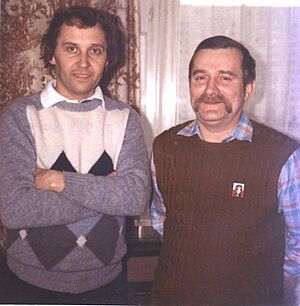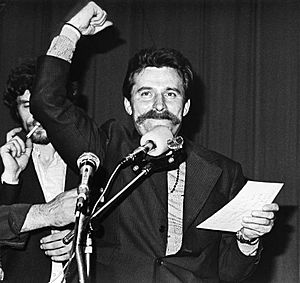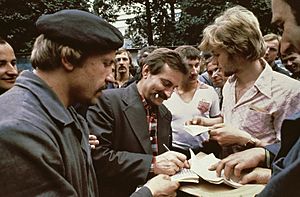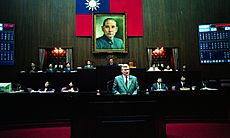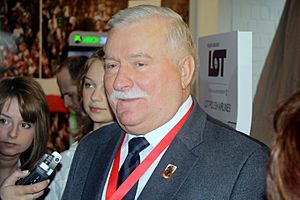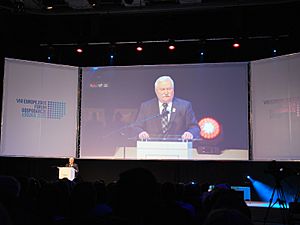Lech Wałęsa facts for kids
Quick facts for kids
Lech Wałęsa
|
|
|---|---|
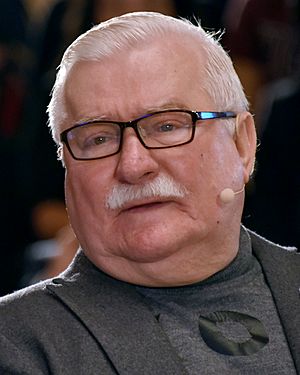
Wałęsa in 2019
|
|
| President of Poland | |
| In office 22 December 1990 – 22 December 1995 |
|
| Prime Minister | Tadeusz Mazowiecki Jan Krzysztof Bielecki Jan Olszewski Waldemar Pawlak Hanna Suchocka Waldemar Pawlak Józef Oleksy |
| Preceded by | Wojciech Jaruzelski (in country) Ryszard Kaczorowski (in exile) |
| Succeeded by | Aleksander Kwaśniewski |
| Personal details | |
| Born | 29 September 1943 Popowo, German-occupied Poland |
| Political party | Solidarity (1980–1988) Solidarity Citizens' Committee (1988–1993) Nonpartisan Bloc for Support of Reforms (1993–1997) Solidarity Electoral Action (1997–2001) Christian Democracy of the Third Polish Republic (1997–2001) |
| Spouse |
Mirosława Danuta Gołoś
(m. 1969) |
| Children | 8, including Jarosław |
| Awards | Full list |
| Signature |  |
Lech Wałęsa (born 29 September 1943) is a famous Polish leader. He was a dissident, meaning he spoke out against the government. He also won the Nobel Peace Prize. Wałęsa served as the president of Poland from 1990 to 1995.
He was the first president of Poland chosen by a popular vote. Before becoming president, Wałęsa was an electrician. He became a leader of the Solidarity movement. This movement helped end Communist rule in Poland in 1989. This event also helped bring an end to the Cold War.
Wałęsa worked at the Gdańsk Shipyard. He became a strong voice for workers' rights. Because of his activism, the government watched him closely. He was fired from his job in 1976 and arrested many times. In 1980, he helped lead important talks. These talks led to the Gdańsk Agreement between workers and the government. He then helped start the Solidarity trade union. Millions of people joined this union.
Later, special military rule was put in place in Poland. Solidarity was made illegal, and Wałęsa was arrested again. After being released, he kept working for change. He was key in the Polish Round Table Agreement. This agreement led to semi-free elections in 1989. These elections brought a Solidarity-led government to power. Wałęsa guided Poland from a communist system to a free-market capitalist liberal democracy. His role in politics became less active after he lost the 1995 presidential election. In 1995, he started the Lech Wałęsa Institute.
Since 1980, Wałęsa has received many awards from around the world. Time magazine named him "Person of the Year" in 1981. He was also named one of Time's 100 most important people of the 20th century. He has received over 40 honorary degrees from universities. These include Harvard University and Columbia University. He has also received many high state honors. These include the Presidential Medal of Freedom. In 1989, Wałęsa was the first foreign person, not a head of state, to speak to the U.S. Congress. The Gdańsk Lech Wałęsa Airport was named after him in 2004.
Contents
Early Life and Education
Lech Wałęsa was born on September 29, 1943. This was in Popowo, Poland, during World War II. His father, Bolesław Wałęsa, was a carpenter. He was taken to a forced labor camp by German forces. Bolesław returned home after the war but died soon after. Lech's mother, Feliksa Wałęsa, was important in shaping his strong beliefs.
Lech had three older siblings and three younger half-brothers. In 1973, his mother and stepfather moved to the United States. They lived in Jersey City, New Jersey. Both were later buried in Poland.
In 1961, Lech finished primary and vocational school. He became a qualified electrician. He worked as a car mechanic for two years. Then, he served two years in the military. He became a corporal. On July 12, 1967, he started working as an electrician. This was at the Lenin Shipyard in Gdańsk, now called Gdańsk Shipyard.
Leading the Solidarity Movement
From early on, Wałęsa cared about workers' issues. In 1968, he told shipyard workers to avoid official meetings. These meetings were against student strikes. He was a strong leader. He helped organize protests in 1970 at the Gdańsk Shipyard. Workers were protesting against higher food prices. Over 30 workers died in these protests. This made Wałęsa even more determined to bring change.
In June 1976, Wałęsa lost his job at the shipyard. This was because he kept joining illegal unions and strikes. He also campaigned to remember the 1970 protest victims. After this, he worked for other companies. But his activism often led to him being fired. He was jobless for long periods. The Polish secret police watched Wałęsa and his family all the time. Their home and workplace were bugged. He was arrested many times for his protest activities.
Wałęsa worked closely with the Workers' Defence Committee (KOR). This group helped people arrested after the 1976 strikes. In June 1978, he became active in the Free Trade Unions of the Coast. On August 14, 1980, food prices went up again. This caused a strike at the Lenin Shipyard. Wałęsa was one of the people who started it. He climbed over the shipyard fence and quickly became a strike leader. This strike inspired others across Poland.
Wałęsa led the Inter-Enterprise Strike Committee. This group coordinated workers in Gdańsk and 20 other places. On August 31, the government signed an agreement with the committee. This was the Gdańsk Agreement. Wałęsa used a very large pen to sign it. This was shown on TV around the world. The agreement gave shipyard workers the right to strike. It also let them form an independent trade union. The committee became the National Coordinating Committee of Solidarity. Wałęsa was chosen as its chairman.
The Solidarity union grew very fast. It soon had over 10 million members. This was more than a quarter of Poland's population. Wałęsa's role in the strike and the new union made him famous worldwide.
On December 13, 1981, General Jaruzelski declared special military rule. Wałęsa and many other Solidarity leaders were arrested. He was held for 11 months. On October 8, 1982, Solidarity was made illegal. In 1983, Wałęsa tried to go back to work as an electrician. That same year, he won the Nobel Peace Prize. He could not go to accept it himself. He feared the Polish government would not let him back into the country. His wife, Danuta, accepted the prize for him.
Through the mid-1980s, Wałęsa continued his secret Solidarity work. His motto, "Solidarity will not be divided or destroyed," was in a leading underground newspaper. After a 1986 amnesty for activists, Wałęsa helped start the Provisional Council of NSZZ Solidarity. This was the first legal Solidarity group since military rule began. From 1987 to 1990, he led the Provisional Executive Committee of the Solidarity Trade Union. In 1988, he started more strikes at the Gdańsk Shipyard. The Polish secret police often questioned him. His wife, Danuta, sometimes teased the agents when they came for him.
After many strikes and talks, the government agreed to negotiations. These were called the Round Table Negotiations. They lasted from February to April 1989. Wałęsa was an important leader for the non-government side. He traveled Poland, giving speeches to support the talks. The government agreed to bring back the Solidarity Trade Union. They also agreed to hold semi-free elections for the Polish parliament.
In December 1988, Wałęsa helped create the Solidarity Citizens' Committee. This group acted like a political party. It won the parliamentary elections in June 1989. Solidarity won almost all the seats they could in the parliament. Wałęsa was a very public figure. He campaigned actively but did not run for parliament himself. The winners were often called "Wałęsa's team."
Wałęsa played a key role in politics. In August 1989, he convinced other parties to form a non-communist government. This was the first non-communist government in the Soviet Bloc. The parliament chose Tadeusz Mazowiecki as the first non-communist Prime Minister of Poland in over 40 years.
President of Poland
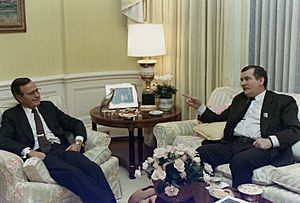
After the 1989 elections, Wałęsa felt some of his allies were too happy to work with former communists. He decided to run for president. His slogan was, "I don't want to, but I have to." On December 9, 1990, Wałęsa won the presidential election. He became Poland's first freely elected head of state in 63 years. He was also the first non-communist head of state in 45 years. In 1993, he started his own political party. It was called the Nonpartisan Bloc for Support of Reforms.
During his time as president, Wałęsa helped Poland change. The country moved to a free-market economy. Poland also had its first completely free parliamentary elections in 1991. He successfully arranged for Soviet troops to leave Poland. He also got a big reduction in Poland's foreign debts. Wałęsa supported Poland joining NATO and the European Union. Both happened after his presidency.
Wałęsa faced some criticism for his style. Some felt he caused too much conflict among former allies. This led to frequent changes in government. As he lost political allies, he was sometimes surrounded by people the public saw as not good enough. His reputation was also hurt by negative campaigning. Some people thought Wałęsa, being an ex-electrician, was too informal for a president. Others felt he was too unpredictable or tried to gain too much power. The difficult change to a market economy also made things hard for his government.
Wałęsa's party did not do well in the 1993 elections. His public support sometimes dropped very low. He narrowly lost the 1995 presidential election. He lost to Aleksander Kwaśniewski. After the election, Wałęsa said he would retire from politics. His role in politics became less important.
After the Presidency
After losing the 1995 election, Wałęsa first said he would go back to being an electrician. But he soon changed his mind. He chose to travel the world giving speeches. He gave talks at universities and public events. He charged a fee for his appearances.
In 1995, he founded the Lech Wałęsa Institute. This group works to share the story of Polish Solidarity. It also educates young people and promotes democracy. In 1997, he started a new political party. He hoped it would help him win future elections. But his run for president in 2000 ended with a big loss. He received only 1.01 percent of the vote. After this, he announced he was leaving Polish politics.
In 2006, Wałęsa left the Solidarity union. He disagreed with the union supporting the ruling Law and Justice party. He also disagreed with the Kaczyński brothers, who were prominent in Solidarity. They were the country's president and prime minister. Their main disagreement was about revealing files of the former communist secret police. Wałęsa felt this could turn into a "witch hunt."
Views on Important Issues
In 2011, Wałęsa refused an award from Lithuania. He was concerned about how the Lithuanian government treated the Polish minority.
Wałęsa is known for his traditional views on LGBT rights. In 2013, he made some comments that caused strong reactions. He later apologized for these comments. He said his intentions were "distorted by the media." He stressed that "one's sexual orientation should lie in one's intimate sphere." Over time, Wałęsa's views changed. He has since supported same-sex marriage in Poland. He has also met with Robert Biedroń, a gay politician. Wałęsa called him "a talent" and "a future president of Poland."
In 2013, Wałęsa suggested Poland and Germany could form a political union. In 2014, he shared his disappointment with US president Barack Obama. He said, "We were hoping that Obama would reclaim moral leadership for America, but that failed."
In September 2015, Wałęsa spoke about the migrant crisis. He said, "watching the refugees on television, I noticed that... they are well fed, well dressed and maybe even are richer than we are." He added, "If Europe opens its gates, soon millions will come through and while living among us will start exercising their own customs." In August 2017, Wałęsa and other Nobel Peace Prize winners urged Saudi Arabia to stop executions.
Wałęsa has actively supported Ukraine's defense. He has called on NATO to keep providing support. He believes a Ukrainian victory is important for protecting democracy.
Allegations of Secret Police Collaboration
For many years, there have been claims that Wałęsa was an informant for the Communist secret police. This was when he was in his twenties. In 2000, a special court ruled he was innocent. This was due to a lack of evidence. However, the allegations have continued.
In 2008, a book claimed Wałęsa, code-named Bolek, was a secret police informant from 1970 to 1976. The authors said he wrote reports and informed on over 20 people. They also claimed he received money for his services. Wałęsa has always strongly denied these claims. He says the documents are fakes.
In February 2016, new documents were found. They were seized from the home of a former interior minister, Czesław Kiszczak. These documents also seemed to show Wałęsa was a paid informant. A handwriting study ordered by a government institute said the signatures on some documents were Wałęsa's. Wałęsa said he had signed a document to cooperate, but never acted on it. He called the files "lies, slander and forgeries." He stated he "never took money and never made any spoken or written report on anyone."
The exact nature of Wałęsa's relationship with the secret police is still debated. In 2018, a court case against Wałęsa was dismissed. The investigation concluded that the alleged act had not been committed. This suggested Wałęsa could be innocent. However, both his opponents and supporters still present different evidence and arguments.
Personal Life and Family
On November 8, 1969, Wałęsa married Mirosława Danuta Gołoś. She worked at a flower shop near his workplace. Soon after they married, she started using her middle name, Danuta. Lech and Danuta had eight children. Their children are Bogdan, Sławomir, Przemysław, Jarosław, Magdalena, Anna, Maria-Wiktoria, and Brygida. As of 2016, Anna runs her father's office in Gdańsk. Jarosław was a member of the European Parliament from 2009 to 2019.
In 2008, Wałęsa had a heart procedure. He had a stent placed and a pacemaker put in. He had another heart operation in 2021. In January 2022, Wałęsa tested positive for COVID-19. He had received three doses of the vaccine.
Awards and Recognition
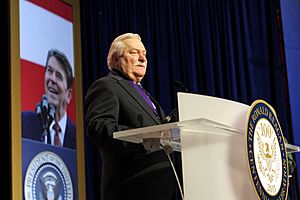
In 1983, Wałęsa received the Nobel Peace Prize. Since then, he has received over 30 state honors. He also has more than 50 awards from 30 countries. These include the Order of the Bath from the UK and the Legion of Honour from France. In 1994, he received the highest state order from Turkey. In 2011, he declined Lithuania's highest order. This was due to his concerns about how Polish people were treated there. In 2008, he created the Lech Wałęsa Award.
In 2004, Gdańsk International Airport was renamed Gdańsk Lech Wałęsa Airport. Wałęsa's signature is part of the airport's logo. A college hall in Chicago is named after him. Six streets and five schools in different countries also bear his name.
Time magazine named Wałęsa "Man of the Year" in 1981. He also received this honor from other newspapers and magazines. He has been given over 45 honorary doctorates from universities worldwide. These include Harvard University and the Sorbonne. He is also an honorary karate black belt. Wałęsa is an honorary citizen of over 30 cities. These include London and Buffalo, New York.
In the United States, Wałęsa was the first person to receive the Philadelphia Liberty Medal in 1989. That year, he also received the Presidential Medal of Freedom. He was the first non-head-of-state to speak to the United States Congress. In 2000, Wałęsa received the Golden Plate Award. Wałęsa carried the Olympic flag at the opening ceremony of the 2002 Winter Olympics. In 2004, he represented ten new EU countries at a special ceremony. In 1993, he was given a personal coat of arms by Sweden.
See also
 In Spanish: Lech Wałęsa para niños
In Spanish: Lech Wałęsa para niños
 | James B. Knighten |
 | Azellia White |
 | Willa Brown |


